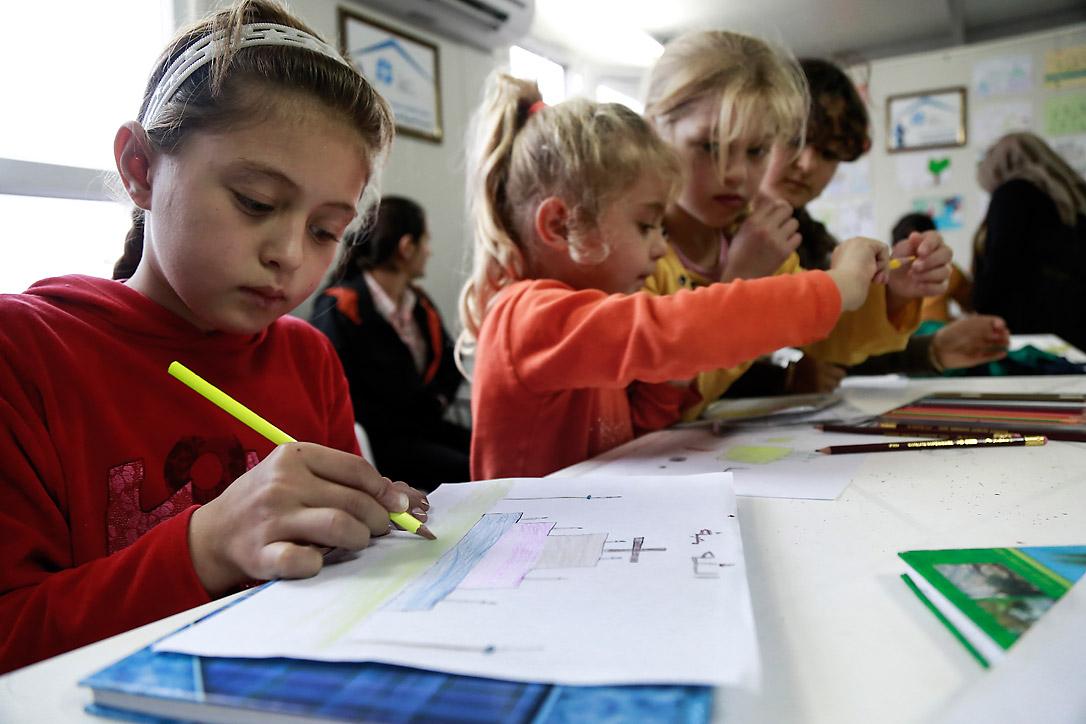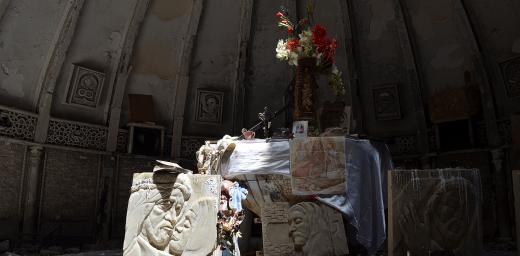Deep gratitude to Polish church for refugee support

Children enjoy recreation activities in an area designated for women at the Davudija camp for internally displaced people, Dohuk, north Iraq. Photo: LWF/Seivan Salim
Junge: LWF churches share the vocation of serving people in need
(LWI) – The Lutheran World Federation (LWF) has received with deep gratitude a "significant" contribution of EUR 15,000 from the Evangelical Church of the Augsburg Confession in Poland to support Syrian and Iraqi refugees, who have fled conflict at home.
LWF General Secretary Rev. Dr Martin Junge expressed his “deep gratitude” to the Polish Lutheran church for its contribution, describing it as “both significant and a message of hope in a complex and challenging political atmosphere in Europe.”
In Dohuk, northern Iraq, LWF has provided around 50,000 internally displaced people with relief goods, including cooking and sanitation kits, shelter and water, education and trauma counselling. Support has also gone to Iraqis who fled the country and found shelter in churches in the Jordanian capital Amman. At the Za’atari refugee camp in Jordan, where nearly 80,000 Syrians reside, the LWF-run Peace Oasis psychosocial center offers peace building activities to children and youth. LWF supports Syrian refugees living in Jordanian host communities with food, shelter and school rehabilitation.
This is the first time the Polish Lutheran church has made a donation to LWF’s work for people fleeing conflict in the Middle East. “Since we are a small church, these funds are not big, therefore we do not lead support action by ourselves but we accompany bigger organizations. The Lutheran World Federation, of which we are one of the founding churches, is our natural partner,” Presiding Bishop Jerzy Samiec said of the contribution.
It also affirms our conviction that each member church, irrespective of its size, location or history, has a unique contribution to our joint diaconal work around the world.
The Polish church started collecting the money through its parish diaconal structures in August, amid an increasing flow of migrants and refugees mainly from the Middle East and Northern Africa into European borders.
At the same time, church members donated food, clothes and other supplies for refugees beyond the country’s borders, such as those arriving at the Slavonsky Brod transit camp near Bosnia and Croatia. The Synod also made a financial contribution to the Evangelical Lutheran Church in Hungary, which in September 2015 was receiving refugees transiting through Budapest on their way to Austria and further on Germany.
Message of hope
Junge underlined the church’s support, saying, “This small church has gone to great effort to raise specific funds towards our global refugee work. It is as an important expression of the solidarity in the LWF communion of churches. It also affirms our conviction that each member church, irrespective of its size, location or history, has a unique contribution to our joint diaconal work around the world. It is a reflection of how much LWF member churches own and share the vocation of serving people in need, which is carried out through the Department for World Service.”
Bishop Samiec: We want to welcome the stranger
The Polish Lutheran church has 70,000 members. Its diaconal work includes relief donations to communities affected by disasters across the world. It is a member of the Polish Ecumenical Council, which promotes local interchurch cooperation. Some of the council’s members support refugees from Ukraine Chechnya and Georgia.
Samiec referred to the communist period to emphasize the diaconal calling of the church: “In those times when the shops were empty and supplies were rationed, we received medicine, clothes, food and other goods from the West. Many of our citizens were refugees and experienced similar help in the countries where they went. We want to be obedient to our Savior, therefore we want to feed those who are hungry and welcome the stranger.”
2.3 million refugees around the world
Through support from its member churches and their related agencies, the LWF currently cares for over 2.3 million refugees and internally displaced people from different nationalities in refugee camps and host communities in Africa, Asia, Latin America and the Caribbean, and the Middle East. In addition, some of its member churches in countries such as Australia, Canada, Finland, Germany and Sweden are hosting or supporting refugees arriving there.
The five-year armed conflict in Syria has pushed an estimated 4.6 million people into neighboring countries as refugees, and displaced another 6.6 million internally, according to the United Nations High Commissioner for Refugees. In Iraq, around 3.2 million people have been displaced within the country, which is experiencing increased sectarian violence and attacks by extremist groups.




